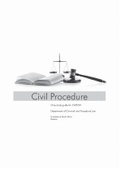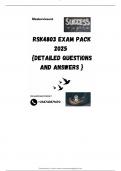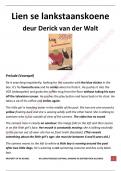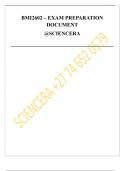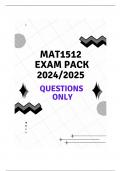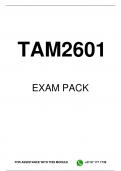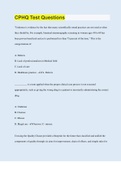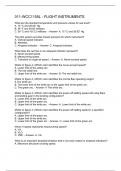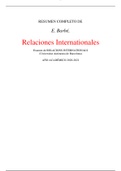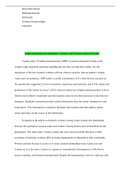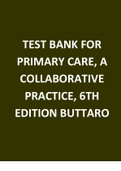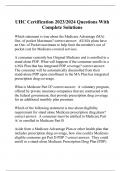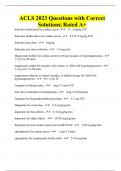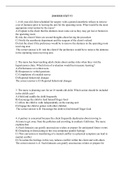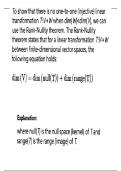EXAM
PACK 2023
, Page 6 of 12 MAC3761
Oct/Nov 2022
QUESTION 1 (50 Marks; 90 Marks)
Stellenbroach Family (“SF”) owns a 25-hectare piece of prime land that is considered suitable for both
agricultural and residential purposes. Currently, only two of these 25 hectares are in use, and primarily
for residential dwelling. SF has now decided to make productive use of the land and will soon establish
a wine and juice making group comprising of two major operating companies. SF has also consulted
with McKingsley Business Consultants (“MBC”), a leading business consulting firm to assist with its
business case. Companies within the SF group will adopt the absorption costing method and the first-
in-first-out (FIFO) inventory valuation method.
1. EXTRACT FROM THE BUSINESS CASE FOR SF-WINERY
One of the group companies to be formed is SF-Winery, whose operation will consist of a vineyard
where white grapes will be produced; wine cellars and juice tanks wherein white grapes will be
processed and subsequently fermented to produce semi-sweet white wine (“SWW”) and white grape
juice (“GJ”). In each financial year, SF-Winery will have one harvest period with an expected average
yield of 600 tonnes of white grapes. Amongst others, the costs relating to the process of wine and juice
making include soil preparation, seeds costs, seed planting costs, irrigation costs, pest control costs,
farm labour costs, harvesting costs and quality inspection costs. After At quality inspection (the grading
process after harvest), grapes are separated into three grades, namely, Grade A (80% of the harvest);
Grade B (16% of the harvest) and Grade C (4% of the harvest).
Only Grade A grapes will be fermented to produce the semi-sweet white wine. During the fermentation
process, a small quantity of Grade A grapes will result in waste. This waste has no sales value and will
be discarded at a cost of R0,15 per kilogram. Thereafter, wine will be stored in barrels to mature and
will only be bottled just before sale. The expected selling price to wine retailers is R65 per bottle of semi-
sweet white wine. Grade B grapes will be processed further to make grape juice, and cellulose and other
organic compounds are added to the grape juice to give it a rich and natural taste (grape juice will be
sold to local retailers at R30 per litre). The annual production is expected to match the annual demand
at 304 000 litres of semi-sweet white wine and 152 000 litres of white grape juice. Grade C will be sold
to pig farmers at R4,50 per kilogram.
2. IRRIGATION COST ESTIMATION FOR SF-WINERY
SF-Winery is exploring the most cost-effective option for its water supply requirements, considering
recent unstable water supply. In this regard, two options (municipality supplied water or borehole
supplied water) are available regarding the expected monthly average water requirements of 11 500
kilolitres. Upon inquiry from Morara Wines, a similar nearby winery, SF was able to obtain Morara Wines’
municipal invoices as shown below.
2.1. MUNICIPALITY SUPPLIED WATER
2.1.1. If the municipality supplied water option is considered, SF will use Morara Wines’ municipal
invoices as a base for estimating irrigation costs. However, the municipality is soon expected to
apply a 6% annual inflationary increase on all its charges. Included in the total municipal charges
below are fixed refuse and sanitation charges of R3 750 per month. Morara’s municipal invoices
reflected the following:
Municipal invoice Water Total municipal
month consumption charges
September 12 500 kilolitres R65 000
October 11 280 kilolitres R59 510
November 11 300 kilolitres R57 905
December 12 350 kilolitres R65 560
, Page 7 of 12 MAC3761
Oct/Nov 2022
QUESTION 1 (continued)
2.2. BOREHOLE SUPPLIED WATER
2.2.1. If the borehole supplied water option is considered, SF will use one of the boreholes currently
used for its residential needs. This borehole was drilled four years ago at a cost of R38 000. With
this option, this borehole will be used to supply 40% of the irrigation water requirements for the
grapes at pumping costs of R2,60 per kilolitre.
2.2.2. SF-Winery will be required to drill a second borehole from which the other 60% of the irrigation
water requirements for the grapes will be pumped. The current drilling costs for a similar borehole
is R45 000, however, as a repeat client, SF is entitled to a 5% drilling costs discount. This borehole
will be used exclusively by SF-Winery. New advanced drilling and pumping technology will make
it possible to reduce the pumping costs for this borehole only, to R1,80 per kilolitre.
2.2.3. SF-Winery will depreciate the boreholes at 5% per annum on a straight-line basis.
2.2.4. The expected annual service costs will be R5 000 for the existing borehole, 70% resulting from
domestic usage and 30% from business usage). For the new borehole, the service costs will be
R3 000. The service costs are mainly driven by the level of usage of boreholes.
2.3. To set up the irrigation system to cover the entire farm, the associated costs are expected to be
R87 000, once-off payable upfront regardless of the option chosen.
3. SF-BOTTLING
3.1. One of the other companies that will be set up is SF-Bottling. The company will manufacture and
sell empty wine bottles (bottles) to both SF-Winery and external customers. SF-Bottling will have
maximum capacity to manufacture 960 000 bottles annually. The bottles come in a standard 750
millilitre size. Although the expected annual demand for the bottles is 410 000 and 640 000 for
SF-Winery and external customers respectively, SF-Bottling will be required to prioritise the supply
of the bottles to SF-Winery. The grape juice is packed in recyclable 1 litre, 2 litre and 5 litre
containers which are sourced externally and not from SF-Bottling.
3.2. The manufacturing costs based on maximum manufacturing capacity are estimated as follows:
Details Amount
Raw material costs per bottle (for glass) R5,50
Direct labour costs per bottle @ R45 per hour R4,50
Total annual manufacturing overheads R2 448 000
Manufacturing overheads comprise of variable and fixed components. Variable manufacturing
overheads are estimated at R21 per direct labour hour. Fixed manufacturing overheads are
allocated based on the annual maximum manufacturing capacity of the bottles.
3.3. Bottles will be sold to external customers packed in a custom-made wooden crate (crate) just
before sale. This crate holds eight bottles and will always be packed as such for bottle sales. All
the crates will be bought from Bathokwa Crates (“Bathokwa”) at a purchase price of R12 per crate.
SF-Bottling has noted numerous complaints from Bathokwa’s existing customers about the fragility
of the crates. In the main, it is complained that unused crate inventories stored for an extended
period frequently break beyond repair, and in large volumes. Internal sales will not be packed in
crates.
3.4. Currently, according to the SF group, to encourage goal congruency, SF-Bottling will sell/transfer
bottles to SF-Winery at a price that equals SF-Bottling’s unit full manufacturing cost per bottle.
However, the selling price will be R15,50 per bottle to external customers. Moreover, SF- Bottling
will incur delivery costs of R0,85 per bottle sold to external customers only.
, Page 8 of 12 MAC3761
Oct/Nov 2022
QUESTION 1 (continued)
4. MANAGEMENT OF THE WOODEN CRATES INVENTORY
Upon presenting to MBC the group’s business case, MBC recommended that instead of the proposed
just-in-time (JIT) inventory management technique, SF-Bottling should rather consider using the
economic order quantity (EOQ) technique. In this regard, the crates’ purchase price will remain the
same; the expected ordering costs are determined at R120 per order; while annual storage and
insurance costs are expected to be R0,75 and R1,50 per crate, respectively.
Furthermore, a safety inventory of 10 crates should be maintained while the applicable cost of capital is
11% per annum. The recommendation by MBC is based on a quantitative analysis. In this regard,
instead of an expected annual holding and ordering costs of R6 000 based on the JIT technique, MBC
is of the view that the implementation of the EOQ technique will only cost R4 500 per annum for holding
and ordering costs.
PLEASE GO TO THE NEXT PAGE FOR “REQUIRED” SECTION


